Motor Rifle Company
"The Hammer, the Sickle, the AK-47"
- – Ahoy
While tanks were the icon of the Warsaw Pact's militaries, it was the infantry that allowed these tanks to lead feared charges into Western Europe. With hordes upon hordes deployed, the Eastern Bloc often combined Soviet doctrine with training and doctrine from World War 2 or even earlier. For example, Poland's militaristic culture combined nicely with Communism while the NVA combined Soviet technology to Wehrmacht doctrine and the German reputation for precision. Regardless of their origins and uniforms, the infantry of the Eastern Bloc lacked the advanced technology that defined NATO forces but made up for it with reliable tools in sheer numbers.
Despite having nearly identical equipment, each faction employs its infantry in different roles thanks to the varying lists and stats.
Motor Rifle Company

"In the Soviet Army, it takes more courage to retreat than to attack."
- – Iosef Stalin
The base of all Soviet Infantry armed with AK74s for the most part. Additional weapons include PKM light machineguns, RPG-7s and a SA-14 Gremlin AA missile team. The differences in game vary mostly in specializing transport like the VDV with their Hinds and the Hardened veterans of the Afghan wars.
In Team Yankee
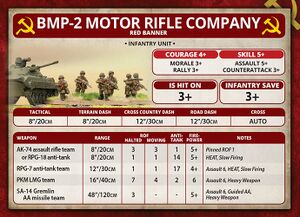
The motorstrelki have the most options for a singular unit. In addition to additional weapons, you have a choice of three transports: BMP-2s, BMP-1s and BTR-60s. A good PACT player can be told from a great one from how they build their motorized infantry lists. There is no correct answer; each of these units are competitive and have their own niche. While your infantry company WILL overwhelm a NATO platoon in a head-on fight, they require support to get there. All the infantry bases in the world are next to useless when hit by machine gun fire and artillery without cover: smoke, artillery and pinning the enemy are essential to making your motor-rifles work, and also a key reason why PACT forces are far less beginner friendly than NATO units which can mostly function on their own (but not ideally).
While their PACT brethren may have 4+ skill, orders are not totally essential when commanding a solid wall of men. The key stats that make Soviet infantry so deadly in the game is 3+ morale and 3+ rally which allow them to recover from pinning most of the time. This means less time spent hugging the ground and more time to carry out your plan, whether its repelling attacks from a building or slowly advancing with smoke to cover. 3+ counterattack is nice to have, but not required in most game plans.
They might be expensive, but are more versatile and have easy access to BMP-2s across most formations, unlike their PACT comrades.
IRL

Soviet Motor Rifle infantry, known as Motostrelki, were the bread and butter of the Soviet Armed Forces since the reformation of the Red Army into the Soviet Armed Forces in 1946. As the name implies Motorstrelki, or MR as they're abbreviated to, were all motorized infantry who were to act as the main Soviet force in any conventional or unconventional conflict. Their job would to act tactically as motorized infantry, and on what the Soviets dubbed the 'operational' level, a level of warfare between the strategic and tactical levels, help in the exploitation, reinforcement, and line holding duties, alongside supplementing tank units, their all motorized nature allowing them to keep up with the extremely high tempo warfare they had planned on.
Their use in battle was to dismount from their BMP, BTR, and MT-LB vehicles at a few hundred meters from their targets, and advance with their attached tanks at roughly equal pace which should, at least in theory, allow for infantry to keep pace with the tanks, allowing the tanks to cover the infantry, and vice versa with targets being pointed out to the tanks through the use of tracers the Motostrelki are given.
Mot-Schützen Kompanie

The Nationale Volksarmee was regarded as the best trained of the Warsaw Pact client states, including both their NCOs and officers who were considered to be a cut above their less motivated allies. Constructed on a base of communist die-hards and reformed ex-Wehrmacht veterans the NVA combined the traditions of a German Army with battle-tested Soviet doctrine. Armed with their older MPi KM (AKM) rifles, the Mot-Schützen lack the added firepower of the under-barrel grenade launcher of their Soviet comrades (reflected in the stats), though they were known for a greater usage of RPKs in the SAW role (not reflected in the stats).
In Team Yankee
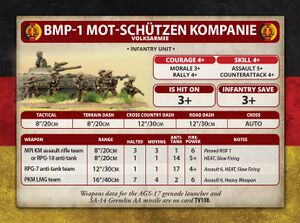

Like any PACT army, the East Germans have a tendency towards hordes of men and machines, and the Mot-Schützen Kompanie is no different. They are functionally identical to Soviet motorized rifles with identical point costs. However, they gain 4+ skill and drop to 4+ rally: expect them to pass orders most of the time, but they are more vulnerable to being pinned. Experienced players will realize the importance of 3+ rally when their infantry choose to stay pinned instead of moving forward, which is the main issue stopping the East Germans from being strictly better Soviets. Motorschützen also lack 5+ firepower on their assault rifles. Take note of this when planning attacks on entrenched or garrisoned infantry.
The two fundamental parts of your unit are the AKM Teams and your RPG-7 teams, but added weapon teams make this unit more interesting. For 1 point each, you can take an AGS-17 grenade launcher team, up to two Spigot ATGM teams and/or one Gremlin MANPAD team. Considering that you can take smaller infantry companies to bring more heavy weapons to the field, certain units may become redundant. For example, 3-4 companies of Mot-Schützen with Gremlin MANPADs could fill your anti-air role in games with point values below 30. Spigots are not purchasable for BMP mounted troops, as your transports are already capable of firing missiles.
Points cost for the motorschutzen are identical to Soviet motor rifles, including the cost of transports.
IRL
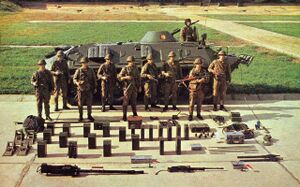
One of the smaller armies of the Warsaw Pact the NVA maintained a high level of readiness like their Soviet comrades in the GSFG garrison, ready to mobilize for war within hours, and remember Berlin was split right in half with western armed forces behind the border in east German territory. If war started the first order of business was wiping those troops off the map as-fast-as-possible so they don't cause trouble. In the event of war, the NVA was to be placed directly into the 5 Soviet Armies of the GSFG, as opposed to their larger allies Poland and Czechoslovakia who would have their own Army-sized units.
You might be wondering why the East Germans have their own infantry models while the other to PACT nations have to make do with painting soviet infantry in different colors. When the National Volksarmee was formed in the late 1950s, they desperately wanted to prevent their soldiers from looking like Red Army clones, as the atrocities committed against the German people in the closing days of the war by the soviets were still very much in the public consciousness. In an effort to minimize obvious red army influences, many Wehrmacht traditions were transplanted directly into the Volksarmee, such as goose stepping on parade, and peacetime uniforms were almost a direct copy of the ones worn by their fathers, just with communist iconography rather than fascist ones. Their signature helmet was actually a wartime design, trailed in 1943 but never put into service due to the fact that helmet factories would have to have been retooled (it was thought that the West Germans would keep using the stalhelm, so to prevent friendly fire they needed something different).
The Volksarmee was so proud of its direct lineage from the Wehrmacht, that they often accused their western counterpart of "selling out" to the west in general and the Americans in particular, as the Bundeswehr had gone to great lengths to distance itself from the past by adopting American gear like the M1 helmet and by removing almost all of the past Nazi traditons.
Zmotory Kompania
In Team Yankee
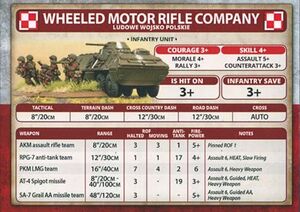
The motorized rifle company (zmotoryzowana kompania piechoty) have a very weird place in the Pact forces as having the best statline for frontline troops: resistant to morale shock and pinning but paying for it in points and weak equipment. Notably, your rifle teams don't have RPG-18s. All anti-tank duties are delegated to your RPG-7 teams, which may or may not be very significant depending on whether you expect your infantry to serve as all-rounders or to fight other infantry for the most part. They do have 4+ skill, which means you should be using orders whenever possible.
As with other PACT forces, try not to have these teams in close combat. You may have plenty of bases, but 5+ assault means you will only land one hit per three teams.
Polish motorized rifles (BTR/OT-64s) may purchase the following heavy weapon teams: 2 Spigot ATGM teams for 2 points each, and an SA-7 Strela team for one point.
Mechanized rifles (BMP-1s/BMP-2s) may purchase only a single SA-7 team, with the BMP-1 mounted team costing 1 point and the BMP-2 mounted team costing 2 points. Companies above the smallest size get 2 PKM LMG teams though, which offer a very solid base of fire that can pin a NATO platoon or shred through doughboys in the open.
Without mass BMP-2s, Polish players are forced to rely on the BMP-1: a decent vehicle, but lacking the AT21 ATGMs that make the BMP-2 so strong. The cost discounts of NVA and Czech riflemen balance this out, something your Poles do NOT get.
However, they do have the best statline second to the VDV if you want your infantry to push forward or just to bog the enemy down without becoming pinned. With 4+ skill and orders, you will have an easier time giving orders to blitz or dig-in and have the required stats to minimize the chances that they will panic and go to ground when hammered by artillery or machinegun fire. 5+ FP means that they excel in close-range firefights against enemy infantry...once you get close enough of course. Use smoke, artillery and cunning plans to ensure that these men can get close and do their job.
A key point with Polish units is that with BMP-1 and BMP-2 mounted infantry, you are paying premium points for the combination of elite infantry and 4+ BMPs with ATGMs. In fact, the maxed out BMP platoons cost 5 points more than their Soviet counterparts. For once you will probably outnumber the enemy by 3 to 2 instead of the usual 40-1 that your Poles are used to. For those who don't get the joke, this will be one of the few times the Poles aren't horribly outnumbered and destroyed.
Mediocre with BMPs, excellent with BTRs/OTs.
IRL

Motorizovaná Pěchota
In Team Yankee
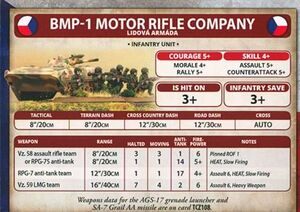
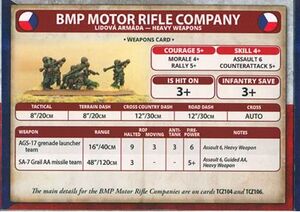
The Rota motorizované pěchoty (motorized infantry company) of the Czechs represent the cheapest infantry one can buy in Team Yankee and interestingly, are the only ones presented as a true conscript force with unmotivated, underequipped soldiers who would rather be getting pissed in babushka's basement than being shot at by strange men shooting at them with big black cannons.
Unlike their Pact brethren, Czech infantry are atrocious on the offensive. Like the East Germans they have 4+ skill to make use of cover, but their 5+ rally stat mean that once pinned by artillery or machine gun fire, they are going to stay there for 3 turns statistically speaking.
In a firefight, the Czechs are rather mediocre. With their Vz.58 rifles having an 8" range, FP6, and pinned ROF 1, they are incredibly unlikely to actually do any damage once suppressed by artillery or gunfire. They may have the numbers, but they don't have the guts to actually fire back at the enemy or close in where their ROF3 Vz.58s can do their work. If you don't run minimum sized companies the Vz.59 LMG team(s) can try to get a few shots off, but you only get one or two depending on your transport choice.
On the attack, a pinned company is a dead company that will fall to machine gun fire, rockets and almost anything that the enemy has to offer. On the defensive? This is where things start to change....
It may seem the Czechs have THE most worthless infantry in the game, which is false thanks to one redeeming factor: cost. While your infantry won't make their points back against all but the worst opponents, infantry in Team Yankee are still the toughest units to dislodge when hiding in taking bulletproof cover. And with skill 4+ you stand a decent chance of digging in. Taken as a single allied company, your conscript horde will HOLD the objective. Any player who has tried to repel dug-in British infantry will give horror stories of these troops gunning down all who tried to get close, before tearing through their men with 3+ assault. NATO players can look forward to sharing their own story, where an objective was protected by 7-21 bases of dug-in infantry. Your dug in infantry company can literally outlast your opponents, having enough bodies that it becomes a mathematical impossibility to capture objectives unless all firepower is focused on killing the defending company. The body-blocking tactics are a possibility with Czech players thanks to their discounts.
You can pay 1 or 2 points for a single stand of AGS-17 grenade launchers and/or SA-7 AA missiles per company with a transport for each team, with the BMP-2 mounted teams costing more. OT-64 mounted infantry also have the option of taking up to 2 stands of AT-4 ATGM for 2 points per team and transport. If you are attacking then these are just extra points for a single stand that will probably spend most of the game moving or pinned down. On the defense the AT-4 ATGM teams, while pretty mediocre, at least mean the enemy can't ignore the company until it is convenient for him to close in, but taking them nullifies any points you saved by not bringing BMPs. Take any points you were considering investing in the AGS-17 and/or SA-7 teams and just bring Shilkas
With BTR-60 and OT-64 mounted infantry you can purchase a 4 point company with 4 rifle teams and 3 RPG teams mounted in 4 vehicles, an 8 point company with 7 rifle teams, 6 RPG teams and 1 LMG team with 8 vehicles, or 13 points gets you 10 rifle teams, 9 RPG teams and 1 LMG team with 11 vehicles. The BTR-60 is slightly less likely to get stuck in terrain, where the OT-64 is can dash a few inches more.
BMP-1 mounted infantry can get a 5 point company with 4 rifle teams and 3 RPG teams mounted in 4 BMP-1s, a 10 point company with 7 rifle teams 6 RPG teams and 2 LMG teams mounted in 9 BMP-1s, or a 12 point company with 10 rifle teams 9 RPG teams and 2 LMG teams mounted in 12 BMP-1s.
BMP-2 mounted infantry can get a 7 point company with 4 rifle teams and 3 RPG teams mounted in 4 BMP-2s, a 13 point company with 7 rifle teams 6 RPG teams and 2 LMG teams teams mounted in 9 BMP-2s, or an 18 point company with 10 rifle teams 9 RPG teams and 2 LMG teams mounted in 12 BMP-2s.
IRL

Probably the most rebellious nation in the Eastern Bloc, Czechoslovak forces were generally quite displeased at being on the Soviet Union's side, especially after the Soviet invasion during the Prague Spring. There was a good degree of mutual animosity between the Soviet Union and Czechoslovakia, so Czechoslovak forces had limited access to or desire to use Soviet gear, often preferring local designs. Humorously enough prior to the 1960s Czech motor rifles would actually be found riding in the German designed SdKfZ 251 half track of World War 2 fame, as these were already in production in Czechoslovakia and they didn't want to switch to making Soviet gear.
Like most Pact forces outside of Russia proper, at the time Team Yankee is set the Czechs still use the older 7.62x39 cartridge instead of the more modern 5.45x39. Contrary to appearances, the Czech forces do not use a variant of the AK rifle and instead use a native design in the vz. 58, which operates differently and has no interchangeable parts (not even the magazine). Compared to an AK it is more accurate and features a last round bolt hold open, but gets unmanageably hot, even with gloves, much quicker. Today the vz. 58 is being phased out in favor of the CZ 805 BREN 5.56x45 NATO. Due to heavy legal restrictions on rifles based on the AK and AR15 platforms, the vz. 58 remains popular among Canadian civilians since the vz. 58 is not an AK. In addition to not being a restricted firearm, it is able to hit the broad side of a barn, uses detachable magazines, able to use modern accessories with minimal work and can use the cheap Chinese 7.62x39 all while not being prohibitively expensive.
| Soviet Forces in Team Yankee | |
|---|---|
| Tanks: | T55AM2 - T-62M - T-64 - T-72 - T-80 - T-72B - T-64BV |
| Transports: | BTR-60 - BMP-1 - BMP-2 - BMP-3 -BMD-1 - BMD-2 - BTR-D |
| Troops: | Motor Rifle Company - Hind Assault Landing Company - Afghansty Air Assault Company - BMP Shock Motor Rifle Company - BMD Air Assault Company - Afghansty BMD Air Assault Platoon |
| Artillery: | 2S1 Carnation - 2S3 Acacia - BM-21 Hail - TOS-1 Buratino - BM-27 Uragan - 2S9 Nona - BM-37 82mm mortar platoon |
| Anti-Aircraft: | ZSU 23-4 Shilka - SA-13 Gopher - SA-9 Gaskin - SA-8 Gecko - 2S6 Tunguska - BTR-ZD |
| Tank Hunters: | Spandrel - Storm - BTR-RD - ASU-85 |
| Recon: | BMP-1 OP - BRDM-2 |
| Aircraft: | SU-22 Fitter - SU-25 Frogfoot - MI-24 Hind |
| East German Forces in Team Yankee | |
|---|---|
| Tanks: | T-55 - T55AM2 - T-72M - T-72B |
| Transports: | BTR-60 - BMP-1 - BMP-2 |
| Troops: | Mot-Schützen Kompanie - Hind Assault Landing Company |
| Artillery: | 2S1 Carnation - BM-21 Hail - RM-70 - 2S3 Acacia |
| Anti-Aircraft: | ZSU 23-4 Shilka - SA-13 Gopher - SA9 Gaskin - SA-8 Gecko |
| Tank Hunters: | Spandrel |
| Recon: | BMP-1 OP - BRDM-2 |
| Aircraft: | MI-24 Hind - SU-22 Fitter |
| Soviet Support: | SU-25 Frogfoot |
| Polish Forces in Team Yankee | |
|---|---|
| Tanks: | T-55 - T55AM2 - T-72M - T-72B |
| Transports: | SKOT-2A - BMP-1 - BMP-2 |
| Troops: | Zmotory Kompania - Hind Assault Landing Company |
| Artillery: | Dana SpGH - BM-21 Hail |
| Anti-Aircraft: | ZSU 23-4 Shilka - SA-13 Gopher -SA-8 Gecko |
| Tank Hunters: | Spandrel |
| Recon: | BMP-1 OP - BRDM-2 |
| Aircraft: | MI-24 Hind - SU-22 Fitter |
| Soviet Support: | SU-25 Frogfoot |
| Czech Forces in Team Yankee | |
|---|---|
| Tanks: | T-55 - T55AM2 - T-72M - T-72B |
| Transports: | OT-64 - BMP-1 - BMP-2 |
| Troops: | Motostrelci |
| Artillery: | 2S1 Carnation - Dana SpGH - RM-70 |
| Anti-Aircraft: | ZSU 23-4 Shilka - SA-8 Gecko - SA9 Gaskin - SA-13 Gopher - M53/59 Praga |
| Tank Hunters: | Spandrel |
| Recon: | BMP-1 OP - BRDM-2 |
| Aircraft: | MI-24 Hind - SU-25 Frogfoot - SU-22 Fitter |
| Iraqi Forces in Team Yankee | |
|---|---|
| Tanks: | T-55 - T-62 - T-72M |
| Transports: | BTR-60 - OT-64 - AMX-10P - BMP-1 |
| Troops: | Motor Rifle Company |
| Artillery: | 2S1 Carnation - 2S3 Acacia - AMX Auf1 - BM-21 Hail |
| Anti-Aircraft: | ZSU 23-4 Shilka - SA-13 Gopher - SA9 Gaskin - SA-8 Gecko - Roland AA |
| Tank Hunters: | Spandrel - VCR/TH |
| Recon: | BRDM-2 - BTR-60 OP |
| Aircraft: | MI-24 Hind - Gazelle HOT |
| US Support: | A-10 Warthog - AV-8 Harrier |
| Iranian Forces in Team Yankee | |
|---|---|
| Tanks: | T-55 - T-62 - M60 Patton - Chieftain |
| Transports: | M113 Armored Personnel Carrier - BTR-60 - BMP-1 |
| Troops: | Iranian Mechanized Platoon - Basij Infantry Company |
| Artillery: | M109 Howitzer - BM-21 Hail - M125 81mm |
| Anti-Aircraft: | ZSU 23-4 Shilka - ZSU-57-2 - SA-8 Gecko |
| Tank Hunters: | Jeep TOW - Jeep 106mm Recoilless - M113 106mm Recoilless |
| Recon: | Scorpion |
| Aircraft: | AH-1 Cobra Attack Helicopter |
| Soviet Support: | SU-25 Frogfoot |